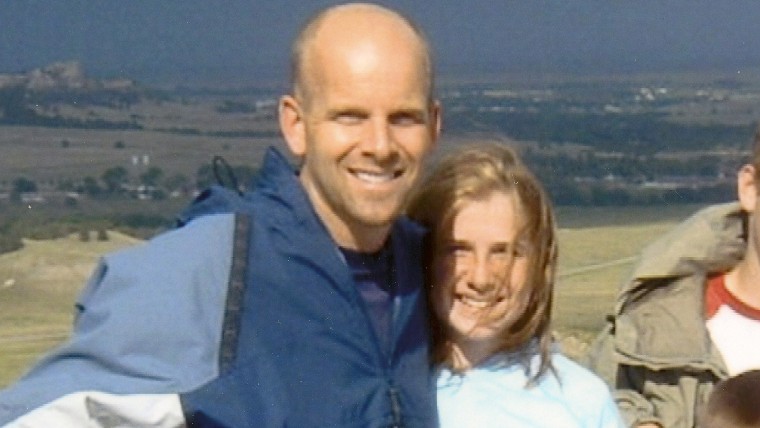Editor’s note: This week we welcome our new crew of TODAY Dads, who will be regular contributors to TODAY Parents. We'll introduce a new one each day with their best #DadHack, that time-saving trick or soul-saving strategy that makes parenting just a little bit easier.

It’s taken me a lifetime of parenting to figure this Dad Hack out.
Parents should not fix and solve everything for their children.
It’s a mantra every dad and mom should have tattooed on the inside of their eyelids. Personally, I got inked when my daughter was 13 years old.
She was always a happy kid. As a cute little girl in ponytails, she would give dissertations about every aspect of her day. All she needed was the open-ended, “Tell me about your day,” and she’d be good for 30 minutes of stories about friends, clothes, games, bike rides, and lunch menus, with details so precise you’d think she was making everything up.
Oh, how I cherished that stage when she shared her world. Until.
Enter the drama of middle school. When her steady, joy-filled life turned upside-down. Some of her tried-and-true girlfriends became the very girls who were the alpha and omega of her hurt. She was crushed.

And I was crushed for her.
So I did what I thought I was supposed to do: help her fix the situation. I’d suggest ideas for making new friends, or brilliant brainstorms for putting the mean girls in their place. And I interrogated her. Boy did I ask a lot of questions.
But all my help was met with the same tearful reaction. Or a slammed door. I didn’t know what to do, and I felt worthless because of it.
Then I tried a new approach following the advice of my buddy, Murphy — a fellow dad who was my go-to guy for parenting wisdom and always gave me a fresh outlook.
The following day my daughter arrived home from school after another bad day and immediately went to her room, stomping up each tread of the stairs — her new way of saying, “I’m home and I’m going to make your life miserable!”
I waited a few minutes and, when things quieted down, I knocked on her door.
“Leave me alone,” she screamed.
I took a deep breath and remembered Murphy’s strategy.
“I’m coming in. Ten seconds,” I said.
When I entered, there she was. On her bed. Stomach down. With her face buried in a pillow.
Not saying a word, I simply lay on the floor, crossed my hand on my stomach and stared at the ceiling. I felt awkward because this was not the dad tactic that came naturally to me.
But I was committed to what Murphy said could be a game-changer in our relationship if could just keep my mouth shut. Listen. And show my child my heart.
After a couple minutes, my daughter lifted her head and uttered four painful words that brought tears to my eyes. "I hate my friends."
I let her words sink in. I paused. I thought about her and not me. And I simply said what I felt.
“Honey, that must suck to feel that way.”
That’s all I said. No questions. No lectures. No bright ideas. Just my heart. Just me. Right there with her in the moment.
She responded by crawling down next to me and sharing details of her hurt as I gazed at the ceiling and reaffirmed my empathy. And my love.
And then, after 10 minutes, she said, “Can we bake some cookies?”
That experience changed my parenting life.
It taught me the value of letting children not only experience pain, sadness and disappointment — but also feel our unconditional connection. And to know what it feels like when their parent is willing to simply be in the moment with them and hold their hand through the hurt.
As parents, we should always help kids solve and navigate the big things in life. Their safety and security are at the top of that list. But when it comes to many of life’s ups and downs, challenges, school projects, disappointments and, yes, mean friends, stop and pause before you fix.
Your child may not want or really need your solutions. They just might want you to join them in their journey.
P.S. As good as I've gotten about not fixing everything for my kids, there are a few things that I just have to fix! As a single dad who's the chief cook and bottle washer, at the top of that list is anything that's a cooking hassle. So here's a mini Dad Hack for fixing sticky, leftover pasta. Bon appétit!
Share your best Dad Hacks on the TODAY Parents Facebook page or on Twitter using #DadHacks.
Jim Higley is the Bobblehead Dad — author, speaker, radio show host, spokesperson and cancer warrior. His favorite role, however, is “Dad” to his three kids. Jim writes for several national publications and is the author of the award-winning Bobblehead Dad: 25 Life Lessons I Forgot I Knew. Find him on Facebook, Twitter, Instagram and Google+ .